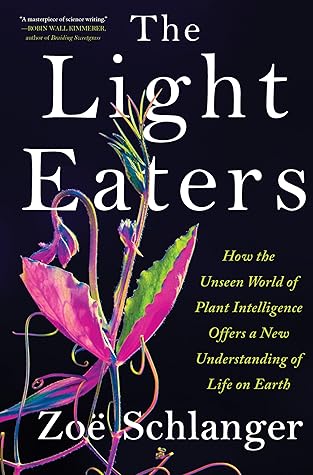More on this book
Community
Kindle Notes & Highlights
Read between
October 8 - October 28, 2024
But vegetabilis came from the medieval Latin, meaning something that is growing or flourishing. Vegetāre, the verb, meant to animate or enliven. Vegēre was the very state of being alive, being active.
Are monocultures like these fields also a monoculture of a single type of personality, I wonder?
“Each of us is a sort of loose committee.”
Or, as British biologist J. B. S. Haldane was rumored to have declared, “I would lay down my life for two brothers or eight cousins.”
“The way I see it now is we need to stop seeing plants, people, nonhuman animals as having different evolutionary motivations. We have the same ones,” Cahill says.
No environment is neutral. Even the supposedly “standard” form for any given plant is likely the impact of its environment. This of course confounds a lot of lab work.
All biology, I began to understand, is in fact ecology. Ecosystem dynamics that ecologists study apply just as easily to single plants themselves.
It’s almost impossible to dig out and remove these vast rhizome networks, and without doing that, the plant can never be extricated. A fingernail-sized root fragment left behind can regenerate the entire plant.
Even just a single tendril of green flesh rupturing concrete begins to split open our understanding of plants as sessile, squishable, inert. A soft thing without eyes or a mouth that applies sustained pressure to our hard boundaries, the only thing between us and the dirt, and it wins the fight? That’s unsettling to a sense of order bent on the supremacy of human ingenuity. The possibility that we are not in charge flicks through the mind. Power is a matter of perspective.
There are limits to saying, In language, what the tree did. —ROBERT HASS, “THE PROBLEM OF DESCRIBING TREES,”
At what point do plants enter the gates of our regard? When are they allowed in to the realm of our ethical consideration? Is it when they have language? When they have family structures? When they make allies and enemies, have preferences, plan ahead? When we find they can remember? They seem, indeed, to have all these characteristics. It’s now our choice whether we let that reality in. To let plants in.
And if corporations can be assigned rights, Stone argues, trees ought to be given them too. Unthinkability is hardly an excuse.
It was with this in mind that I watched from afar as wild rice sued the state of Minnesota.


